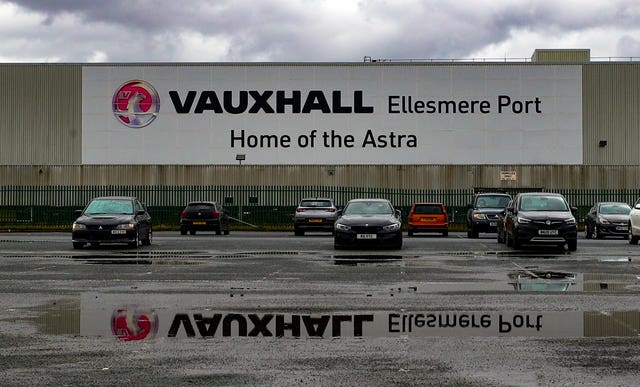
Clive Bull 1am - 4am
26 November 2024, 17:44

Stellantis announced plans to shut the Luton factory next April, putting more than 1,100 jobs at risk.
The owner of Vauxhall and Citroen has said plans to shut its Luton van-making factory and create an all-electric plant come amid “stringent” UK Government zero-emission targets.
Stellantis announced plans to shut the Luton factory next April, putting more than 1,100 jobs at risk.
Business Secretary Jonathan Reynolds said it was a “very difficult day for Luton” following the announcement.
The closure forms part of the group’s proposal to consolidate its UK manufacturing of vans to create an all-electric hub at its Ellesmere Port plant in Cheshire.
It is set to invest £50 million in the Ellesmere Port site, having invested £100 million three years ago in a shift to battery-electric production.
Stellantis said the decision was made within the context of the “stringent” UK zero-emission vehicle mandate.
Under the current rules, this requires 22% of all new car sales to be battery-electric vehicles in 2024, with the target rising to 80% by 2030 and 100% in 2035.
Last week, ministers met with automotive leaders to discuss the sales quotas for electric vehicles.
Carmakers and retailers have expressed fears that the mandate is putting jobs at risk at UK vehicle factories and piling pressure on manufacturers.
Concerns have also been raised over a lack of charging infrastructure across the country to support the transition to electric vehicles.
The announcement from Stellantis also comes a week after Ford announced it will cut about 800 roles across the UK over the next three years amid pressure from “lower-than-expected demand” for its electric cars.
About 1,120 full-time employees work at the Luton factory, which currently makes light commercial vehicles.
Stellantis said it had launched a consultation with employees and union partners on its proposals.

If they are approved, hundreds of permanent jobs will be created at the Cheshire-based factory for affected staff who wish to relocate, the firm said.
Stellantis also said it would offer job support, including opportunities for retraining, to all those impacted – and will work with local government and employers to find new work for Luton-based employees.
A spokesman for the Government said: “While it’s encouraging to see Stellantis investing in the future of its Ellesmere Port plant, we know this will be a concerning time for the families of employees at Luton who may be affected.
“We have a longstanding partnership with Stellantis and we will continue to work closely with them, as well as trade unions and local partners on the next steps of their proposals.
“The Government is also backing the wider industry with over £300 million to drive uptake of zero-emission vehicles and £2 billion to support the transition of domestic manufacturing.”
Stellantis plans to have the consolidated production line at Ellesmere Port in operation by the second half of 2026.
The Ellesmere Port factory makes battery-electric light commercial vehicles including for Vauxhall, Citroen, Peugeot and Fiat.
The carmaker said the plans could contribute to making its production more efficient.
Business Secretary Jonathan Reynolds said the Government would consult on changes to the zero-emission vehicles (Zev) mandate because it was not working as expected.
He told MPs: “Myself and the Transport Secretary, who I work with very closely around this, are looking at that particular policy, that Zev mandate, to make sure it’s operating in such a way that allows British manufacturing to get to that destination.
“And there’ll be a consultation announced in due course – on an expedited timescale – that allows us to consider ‘is that policy currently operating as anyone expected it to?’.
“I don’t think it is and I get the seriousness and the urgency of the situation.
“We have to accept and have to analyse whether the environment in the UK for automotive manufacturing is one that’s going to get us to the destination in a way which keeps those jobs and industry in the UK.”